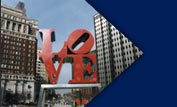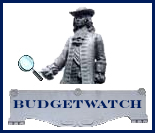- Home
- About
- News
- Tax Reform
- Ethics Reform
- Budget Reform
- Reformer’s Roundtable
- Contact Us







Mayor Nutter's Unkindest Cut

Mayor Nutter's announcement of budget cuts to deal with the local effects of the international economic crisis is somber news for Philadelphians. There is no doubt that this crisis is real and serious and that cities and states across the country are making similar adjustments to their own spending plans.
In the face of these difficulties, Philadelphia's long-term challenge remains fairly simple. The cost of living and doing business in Philadelphia is too high compared to other cities and surrounding jurisdictions, and for many residents and employers, Philadelphia's quality of life and the quality of the marketplace is too low given those high costs. We must find ways to reduce those costs AND improve amenities to attract and retain residents and employers. Mayor Nutter's decision to end the city's successful tax-reduction program while reducing services enjoyed by residents does nothing to help us address our fundamental long-term challenge of reversing decades of job and population loss.
Thus, in second guessing the Mayor's decisions, many are wondering whether he could have cut spending that does not directly affect service delivery or increase other city revenues without affecting the city's planned schedule of tax reductions. Unfortunately, because the Mayor chose to craft his budget-adjustment plan behind closed doors, we have no idea which other options he rejected, which ideas he never considered, and which assumptions he made to guide his decision-making process.
The elimination of transparency and the reduction of openness is the unkindest cut of all from Mayor Nutter.
Candidate Nutter touted his "Honest Budget Now" plan on the campaign trail:
"This policy paper illustrates my promise to lead Philadelphia with a new spirit of progressive reform and open-decision-making. I invite all Philadelphians to join me in the demanding but rewarding process of self-government."
Inaugurated Mayor Nutter said this on the day of his swearing in:
"There is nothing government does that cannot be done ethically and transparently."
But, in dealing with this major crisis, and in unveiling budget cuts and even reversals of his central campaign policy promises, Mayor Nutter kept the public in the dark and even barred reporters from meetings where the Mayor and City Council discussed the proposed actions.
Could it be that the seductive poetry of the campaign yields so quickly to the calculating prose of governing? Mayor Nutter, we all expected better from you. More than the pain of any of your proposed cuts, the violation of this central promise of your candidacy and mayoralty hurts profoundly.
*
One narrative that has been promoted to tell the story of this crisis is that the city was blindsided by extraordinary events and that we could have done nothing to mitigate the pain we are enduring today. Of course, this is certainly not true. Philadelphia Forward and so many others - including Mayor Nutter, himself - have championed policies like the establishment of a Rainy Day Fund, rightsizing of the city government, long-term budgetary structural balance, and a top-to-bottom examination of city expenditures that, had they been adopted in recent years and months, all would have made Philadelphia better equipped to deal with today's challenges.
In fact, Philadelphia Forward's BUDGETWATCH has warned against inaction on these fronts as recently as in the months preceding today's crisis. In a piece that was posted on February 19, 2008 titled "Is Mayor Nutter's First Budget An Honest Budget?" we called on the Mayor to make good on his campaign promise and establish a Rainy Day Fund and then warned that the proposed Nutter budget plan to overspend revenues placed the city's finances at risk:
"Mayor Nutter projects to spend more money than we raise for the coming year and for every year of the city's Five-Year Financial Plan. We are able to spend more than we raise each year because we are essentially depleting a relatively large accumulated surplus, but obviously such a pattern cannot be repeated indefinitely. Mayor Nutter must begin to produce spending plans where obligations do not exceed revenues."
When the first questions were raised about holes in the Mayor's budgetary plans, we offered a May 2, 2008 piece titled "There's A Hole In The Budget…Then Fix It," that offered some initial thoughts:
"On the revenue side, our leaders would be wise to pursue efforts to improve city tax collections so that those who owe, pay. Similarly, Philadelphia has been slow to follow the lead of other cities that have generated revenues from improved rights-of-way management, assets sales, and marketing initiatives. On the expense side, the city has a wonderful opportunity to embrace the array of programs working in other cities to link expenditures to performance and inspire effective and efficient government operations."
After initial positive indications regarding city tax revenues, we saw signs of trouble with Business Privilege Tax collections (just one more reason why most cities do not rely on such a volatile revenue stream that has severe jumps and dips depending on economic conditions) and in an August 8, 2008 piece titled "City Tax Collection Upon Reflection," we warned that the Mayor's future tax-revenue projections were questionable:
"The budget counts on generating $187 million from the Real Estate Transfer Tax, which would require tax revenues to essentially match last year's numbers after two years of decline. The budget also counts on generating $442 million from the Business Privilege Tax, which may be overly optimistic given the performance of the tax this year."
The lesson we should take from the failure to proactively avoid some of our current difficulties is that more openness and engagement can help us today and in the future. Walt Whitman famously declared "A great city is that which has the greatest men and women." Ours IS a great city and there are some great men and women who can be very helpful to our chief executive, but we cannot make our city the Philadelphia we know it SHOULD be if we are excluded or if decisions that will affect our lives are made behind closed doors.
